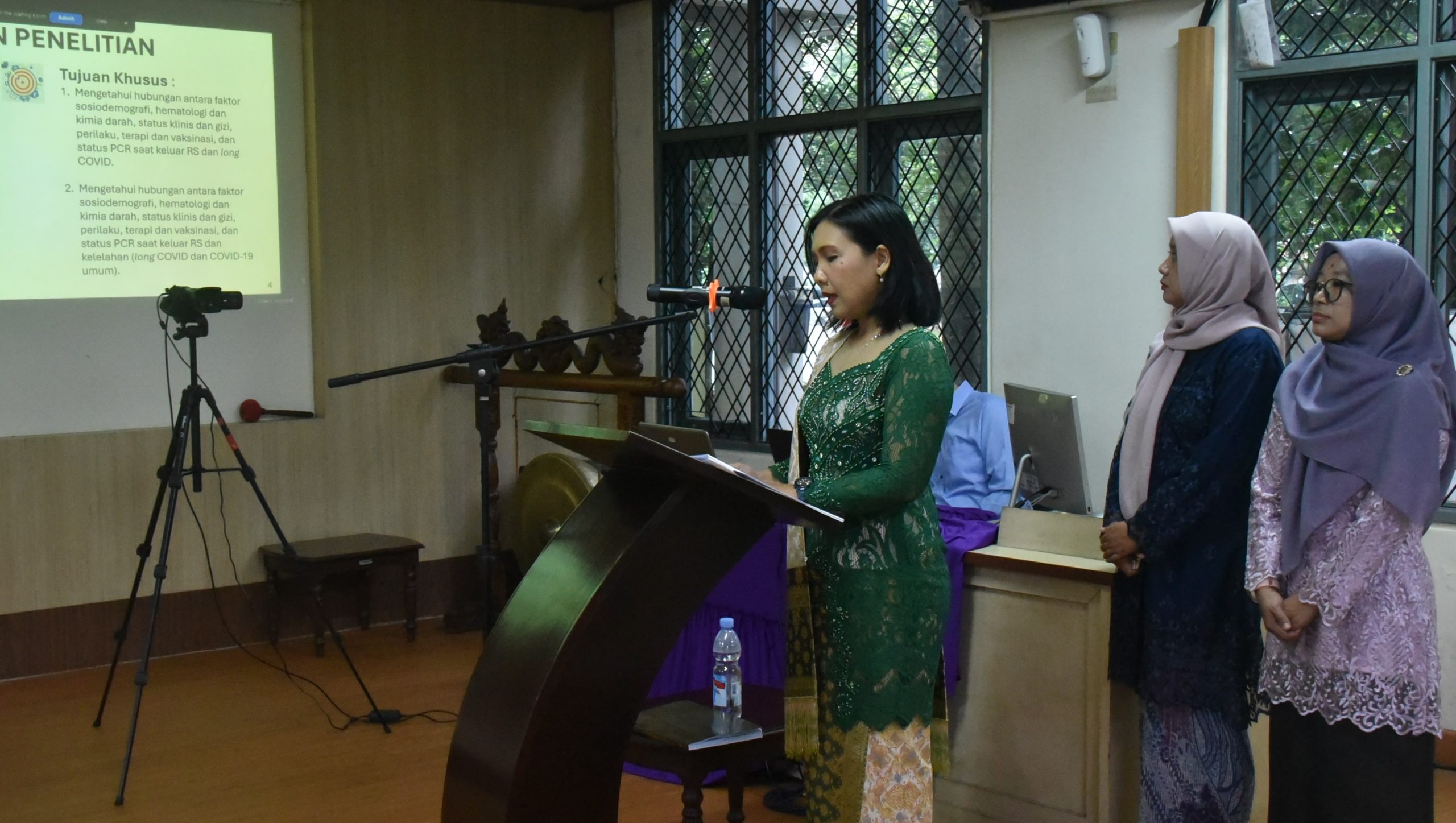The Faculty of Public Health (FPH) Universitas Indonesia (UI) held a Doctoral Promotion Session on Monday, June 23, 2025, at the Doctoral Promotion Room, Building G, FPH UI. Promovendus Hotma Martogi Lorensi Hutapea from the Doctoral Program in Epidemiology presented his dissertation titled “Factors Influencing Long COVID and Fatigue Among COVID-19 Survivors Previously Hospitalized in Several Hospitals in Palembang.” The open session was chaired by Prof. Dr. dr. Ratna Djuwita, M.P.H., with Prof. dr. Mondastri Korib Sudaryo, M.S., D.Sc., as the main supervisor, and Dr. dr. Tri Yunis Miko Wahyono, M.Sc., and Prof. Dr. rer. nat. Arli Aditya Parikesit, S.Si., M.Si., as co-supervisors.
Hotma addressed Long COVID as a post-SARS-CoV-2 infection condition marked by symptoms lasting more than two months, with fatigue as the most common complaint. Other symptoms include cough, shortness of breath, depression, and a significant decline in quality of life. As of May 3, 2025, Indonesia had recorded 1,465 active COVID-19 cases, with a cumulative total of 61,332,835 and 13 new cases reported over the past week. Amid ongoing transmissions, understanding risk factors and fatigue biomarkers remains limited. This study aimed to identify risk factors influencing Long COVID and fatigue and to assess the relationship between the binding affinity of SARS-CoV-2 ssRNA to human TLR-8 receptors and Interleukin-6 (IL-6) levels among hospitalized Long COVID patients in Palembang.
The research adopted an ambispective cohort approach involving 257 adult patients who were hospitalized for five days or more due to COVID-19. Clinical, demographic, and vaccination history data were collected, while fatigue levels were measured using the Fatigue Assessment Scale (FAS). IL-6 levels were measured via ELISA, and in-silico analysis was conducted to evaluate the impact of ssRNA mutations on TLR-8 binding affinity and IL-6 levels.
Findings revealed six significant factors associated with Long COVID: acute fatigue during hospitalization, chronic kidney disease, positive PCR results at discharge, thrombocytosis, vaccination status, and exercise habits. Additionally, erythrocytopenia and the use of oxygen therapy were linked to Long COVID-related fatigue, while acute fatigue and regular exercise influenced general post-COVID fatigue levels.
An interesting discovery was that Delta variant infection increased the risk of developing Long COVID but surprisingly reduced the risk of fatigue. Elevated IL-6 levels also showed a strong association with fatigue, even after adjusting for confounding variables. Hotma emphasized, “Fatigue from COVID-19 results from a complex interplay of clinical, behavioral, and viral variant factors, positioning IL-6 as a potential biomarker to better understand the pathophysiology of post-COVID fatigue.”
Based on his findings, Hotma recommended that the Ministry of Health and local health offices continue COVID-19 vaccination programs and enhance public education to encourage full vaccination. He also stressed the importance of strengthening the Healthy Living Community Movement (Germas) and health communication initiatives to promote regular exercise as a preventive measure against Long COVID and fatigue. Moreover, genomic surveillance must be reinforced to track SARS-CoV-2 variant dynamics and integrate this data into existing national surveillance systems.
Hotma also offered recommendations for hospitals, urging early detection and diagnosis of fatigue symptoms using scientifically validated assessment tools during inpatient care. Proper early management is crucial to prevent prolonged fatigue and reduce Long COVID risks. Optimal care for patients with chronic kidney disease is also vital to avoid complications. “Additionally, hospitals should consider extending antiviral therapy based on PCR cycle threshold (CT) values, in line with further studies on SARS-CoV-2 viral viability,” he added.
The doctoral promotion session was attended by several examiners, including Prof. Dr. Besral, S.K.M., M.Sc.; Trisari Anggondowati, S.K.M., M.Epid., Ph.D.; Prof. Dr. Sunarno, M.Si. Med.; Prof. Dr. dr. Radiyati Umi Partan, SpPD-KR.; and Dr. Adi Yulandi, S.Si., M.T. After careful assessment by the examination board, Promovendus Hotma Martogi Lorensi Hutapea successfully defended his dissertation and graduated with the highest honors, earning a cumulative GPA of 3.91.
With his graduation, Hotma became the 10th graduate of the Doctoral Program in Epidemiology at FPH UI in 2025, the 125th overall graduate of the program, and the 457th doctoral graduate from FPH UI. His achievement not only strengthens scientific contributions in clinical epidemiology but also provides a vital academic foundation for health policy development regarding post-COVID recovery in Indonesia. (DFD)

